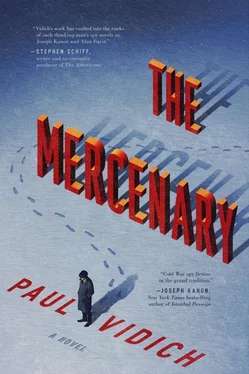“I come here on summer nights,” she said. “I look out and wonder what Moscow was like in Tolstoy’s time. I think of the people then, their lives, their struggles, and the smells of that city. All gone. And this too, what we are looking at, will be gone. But gone in a different way. I miss what it never was.” She looked at Garin. “Do you understand?”
He didn’t respond.
“I’m talking nonsense,” she said, laughing to herself. “I was brought up here as a child by my father, who told me stories about his father, and he pointed to the landmarks. Then I would come up by myself and look at St. Basil’s, the Kremlin, and Moscow River. I was an unhappy child, but I was content here. I wished I had lived in Tolstoy’s Moscow. I thought it would have been a better time to be alive. As if I had a choice.”
She raised her arm toward the red star on the Spasskaya Tower inside the Kremlin wall. “Now there is only the State and the Party. Our Evil Empire.” She mocked the words. “It is a stupid phrase. We are not evil, and we are not an empire. Your politicians denounce us to feel good about themselves. This is Russia. We are only people. Yes, we have Party apparatchiks like the ones who pulled Maria Yudina from her bed to record her song. They were frightened of Stalin. Fear rules here.”
She studied his face. She straightened her back. “I am a little frightened. Frightened of you.”
“Why me?”
“Because I am fond of you.”
They were standing close to each other, not touching, but their eyes met. Neither said anything for a long moment.
“Come,” she said. “It’s cold.”
“It’s cold!” he shouted into the night.
“What are you doing?”
“It’s cold!” he shouted again.
“You’re crazy. Neighbors will hear you. They’ll call the militia.”
“This is the Moscow I remember,” he said, resisting as she pulled him toward the roof door. He pointed at the sheltering sky and the grim beauty of the sad city. He howled.
“Come,” she said, laughing. “We’ll freeze to death, and then all the food in the refrigerator will go to waste.”
They descended four flights down the winding marble staircase to her apartment.
“You will sleep in my brother’s room.” She pointed to the small room at the end of the hall where he’d slept for two nights. “You know where the bathroom is.”
The bedroom had a frilly dressing table and a satiny bedcover she had neatly turned down. He slid under the covers. A full moon had risen and washed the room in silver light. There was a fight in his heart that kept him awake. He went over their conversation, and even as he pushed aside thoughts of her, Natalya kept invading his imagination, until finally he forced himself to concentrate on Petrov’s escape. He considered the plan and tested its parts to understand where it was weak and where it could fail. The repetition of detail had a sedative effect. He clung to his drowsy worry like a drunk coddling his empty bottle, until the numbing patterns put him to sleep.
At one point, he thought he heard a sound outside. He went to the window, closed the curtain, and pulled back one corner, making sure that he couldn’t be seen from the street. There was only a three-legged dog loping in the shadows. Garin looked in both directions, certain that he had heard the sharp click of a car door closing. The quiet street was dark and empty. He dropped the curtain. Before slipping under the bedcovers, he happened to glance down the hall and confirmed that Natalya’s bedroom light was off.
* * *
GARIN WOKE WITH a start. Bright morning light bled through the edge of the closed curtain. For a moment, he didn’t know where he was or even what part of his life he was in. He sat up quickly and recognized his shoes, clothes, and then the bedroom. He remembered.
Garin was on the bed tying his shoes when he noticed his wallet on the dressing table was open. He went through it and confirmed its contents: cash, false identification, several old photographs, and two random receipts. He unfolded one. The trick was simple. He kept a strand of hair in the fold, where it would be imperceptible to any person who went through his wallet. If it was missing, he knew his wallet had been searched. The hair was gone.
Garin considered her deceit. There was nothing in his wallet that compromised him, but she had been looking for something.
“COMING, COMING.”
Garin had knocked three times when he heard Natalya call from inside the apartment. When the door opened, he presented a cloth bag with eggs, a loaf of black bread, and a duck he had bought on the black market in his old neighborhood. The toothless old woman had recognized him when she took his money but said nothing.
“Thank you.” Natalya wiped her hands vigorously on her apron. Under the apron she wore a long skirt, a black silk blouse, and her pearls. She pulled him into the apartment and glanced nervously down the stairwell. “You’re late, but you weren’t followed. An American businessman was arrested this afternoon.” She took the cloth bag. “I made my mother’s favorite recipe. She had only one, so it was her favorite. Kotlety . I will also cook the duck. We will have the eggs for breakfast.”
She looked at him, her head cocked slightly. “Your disguise is terrible.” She straightened his glasses on his nose. “I expected you hours ago. I thought you might have been detained. Thank God you weren’t. I hate to eat alone.” She removed the envelope from the bag. “What’s this?”
Garin had made a second visit to the Russian Orthodox church. “It’s for Posner. He’s expecting it.” Garin removed his shoes in the vestibule, as he’d been instructed. “Smells good.”
“We’ll see. I don’t cook often. There is always someone who asks me to dinner.”
She had set the dining table and placed a vase in the middle with a single red rose. “White is for cemeteries. Red goes with the wine I got from a friend.”
Garin washed his hands. He was aware that she’d straightened up. A pair of beige hosiery hung on the shower rod, and the overpowering lavender fragrance of a cleaning product came to him as violent red.
“Comrade Posner was questioned today,” she called out from the other room.
Garin emerged and pretended surprise. “For what?”
“I don’t know. We had a meeting in his office, but he didn’t come. I asked where he was. Everyone was quiet. His secretary was almost in tears. Everyone knew something, but no one said anything. This is the way it happens.” Her brow wrinkled, and her voice deepened. “He protected me, and for that I am grateful, but everyone in his department will be under suspicion.”
So it had begun. Garin tried to look worried. “Get him the envelope tomorrow. It’s important.”
Wine and nervousness made Natalya garrulous at dinner. He asked about the apartment, and she said that it had belonged to her maternal grandfather, a prosperous criminal defense lawyer, who had once defended Lenin in St. Petersburg. After the Revolution, he’d had the privilege of joining the Party and keeping his bourgeois lifestyle. “He gave it to my mother, and now I have it,” she said. “With all its ghosts.”
“Is that her?” Garin said, pointing to a photograph.
“No, my father removed her pictures. He didn’t want to be reminded.” She drank her wine and was quiet. “She was a typical Russian Jew. She decided the best thing for me was to become a ballerina, and I thought, well, that’s a good idea, but then I realized that she wanted me to accomplish what she had dreamed for herself as a child. All her frustrated ambitions landed on me. And then she died.”
Читать дальше












